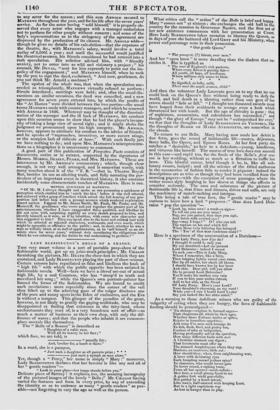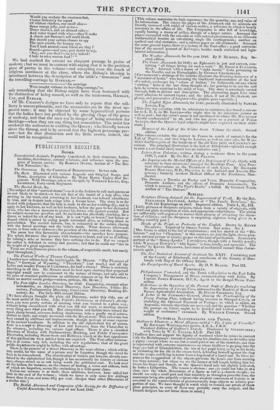LADY BLESSINGTON ' S BELLE OF A SEASON.
Tans very smart volume is a sort of portable peep-show of the fashionable world, got up on joint-stock principles ; Mr. CHALON furnishing the pictures, Mr. HEATH the show-box in which they are contained, and Lady BLESSINGTON playing the part of show-woman. Certain censors have repudiated as false and libellous the hash of "high life" with which the public appetite has been satiated in fashionable novels. Well—here we have a literal set-out of actual high life, by a real Countess, who has " stoop'd to truth and moralized her song ;" while the Queen's own portrait-painter has limed the forms of' the fashionables. We are bound to credit such revelations ; more especially since the corner of the veil thus lifted Up to the admiring gaze of the vuler discloses one of the pure and sunny spots in the Eden of exclusives, and the Eve is without a tempter. This glimpse of the paradise of the great, however, is not likely to gratify the gaping multitude, who may be disappointed at finding that existence in the fairy-land, whose enchantments they read of, is a very humdrum sort of affair—as much a matter of business as their own shop, with only the dif- ference of wares ; and that the people who inhabit it are common- place mortals like themselves.
The "Belle of a Season" is described as
"Daughter of a noble race, With all its beauty in her face;"
which face, we are told, is
"proudly fair; And, lovelier far, a heart is there."
In a word, she is a paragon,
" Just such a daughter as all parents prize ; * * * just such a nymph as men adore."
Yet, though a " Percy," her name is simply" Mary :" moreover, Lady BLESSINGTON declares that her heroine is like any and all of her gentle readers "— " Look in your glass—her image stands before you." Delicate piece of flattery ! it explains, too, the seeming incongruity of the pictured images of the lovely " Belle e' Mr. CHALON having varied the features and form in every print, by way of extending the identity AO as to embrace as many "gentle readers" as pos- sible—not forgetting to vary the age as well as the person.
" The youngest, (?) fairest, ever seen."
And her "open brow" is more dazzling than the diadem that en- circles it. She is typified as
" The rose of England's rich parterre, Where every flower is passing fair— All youth, all hope, all loveliness, Whom millions only name to bless. * * * * * * So dignified, so lofty, mild, There meet the angel, woman, child."
And then the volunteer Lady Laureate goes on to say that no one could look on the Queen's thee without being ready to defy the world, and bail death as a blessing rather than one gem of her crown should "fade or fall." "I thought ten thousand swords must have leaped from their scabbards to avenge even a look which threatened her with insult. But the age of chivalry is gone : that of sophisters, economists, and calculators has succeeded e' and though " the glory of Europe" may not be " extinguished for ever," we fear that the thoughts of Lady 11Lns5isoTox on VICTORIA, like the thoughts of BLUME On MARIE .ANTOINETTE, are somewhat in the clouds.
To return to our Belle. Mary having now made her debitt in due form, goes the round of fashionable life—routes, dejeuners, fancy balls, the Opera, and Epsom Races. At her first party she catches a " desirable," an heir to a dukedom—young, handsome, and virtuous like herself. The course of true love does run smooth in this case—and rapid too, for the finale of the Belle's first sea- son is her wedding, without so much as a flirtation to ruffle her brow. This blissful career, brief though it be, is, like all sub- lunary sweets, insipid ; and all the science of the titled authoress in the accessories of fashion fails to render it piquant : indeed the descriptions are as trite as though they had been versified from the morning papers—with the exception of some passages where the writer seems slyly laughing in her sleeve at things she affects to consider seriously. The sum and substance of the picture of fashionable life is, that fetes and dinners, drives and calls, are only the machinery of match-making and intrigue.
This being a tale of' true love, the "gentle reader" may be curious to know how a lord " proposes :" thus does Lord Delo- raine "pop the question'—
" Look up, mine own! a word—a sign—
To tell me you are ever mine! Nay, are you pained, that thus you sigh, And listen with averted eve ?
Say—may I hope ? " 0 r who can tell The rapture on his soul which fell
When those twin faltering lips betrayed The 4 Yes' of that dear conscious maid?" What critics call the "action" of the Belle is brief and happy. Mary "comes out" at sixteen ; she exchanges the old hall in the country for the mansion in Grosvenor Square, and the first act of her new existence commences with her presentation at Court. Here Lady BLESS1NGTON takes occasion to blarney the Queen, as in days of yore she buttered old Lord GREY and his Ministry, when power and patronage were in their possession.
" Our gentle Queen,"
is
Here is a specimen of the conversation of a Dutchess-
" Dear Lady Percy., how d'ye lo?
I thought it could be only you My son described—Let me present Lord Deloraine : indeed I meant To seek you—This is Lady Mary, Whom I remember, like a fairy, Then tripping lightly round your room, Her lip all smiles, her cheek all bloom. I should have known her by her brow
And chin. Dear girl, will you allow
Me to present Lord Deloraine? You'll make his mother very vain If you to him your smiles extend, And to her also, as the friend Of Lady Percy. How's your Lord? Your daughter's charming, on my word! While you—I vow I heard Lord Lyster Say you looked like her elder sister."
As a warning to those indelicate misses who are guilty of the vulgarity of eating when they are hungry, the laws of fashionable feeding should be promulgated-
"fis strange—explain it, learned sages—
That chaperons all, whate'er their ages, Whether dame Fortune smiles or spites, Rejoice in boundless appetites; And some I've seen such homage do To fish, flesh, fowl, and pastry too, Fearless of ache or indigestion, Having profoundly solved the question, How many different foods with zest A Christian stomach can digest; That hecatombs must offer up The amazed Amphitryons where they sup. Maidens, au contr«ire, little eat : How should they, when, from neighbouring seat, A lover with devouring eyes Each tempting morsel jealous spies? Ye charmers, who would lovers gain To hover round, a sighing train, From all but sparrow-meals refrain : Men hear, a small plump hand to see A golden fork wield gracefully, Not guided by a heart intent, Like nun's, half-starved with keeping Lent, But in a light capricious way As less in hunger than in play. Would you enchain the creatures fast, Choose delicately for repast
Of whitest chicken, one small slice— Some orange jelly, cool as ice— Three cherries, and an almond cake—
And water tinged with wine,—they'll make A charm not Samson's self could break.
But should your suitors chance to spy The open mouth, the hungry eye, You'll look around—and where are they ? Scared—gone—and sure, past doubt to say, ' Nay, saw you that ?no joke indeed: I hate to see a woman feed ! ' " We had marked for extract an eloquent passage in praise of modesty ; but we must be content with saying that it is the prettiest piece of poetry in the volume—not excepting even the touch of religious sentiment at the close, where the Bishop's blessing is introduced between the description of the bride's" trousseau" and the travelling-carriage by BARKE11,—
" for marriage Were nought without its travelling-carriage,"- only remarking that the Bishop might have been honoured with the distinction of being named, as well as the tradesmen, HAMLET, rny, and BARKER.
Of Mr. CHALON'S designs we have only to report that the mil- linery is unexceptionable, and the accessories are in the most ap- proved taste : it may be objected by sonic hypercritical persons that the ladies have not profited by the glowing 6loge of the grace of modesty, and that the men are in danger of being mistaken for blacklegs—when they are any thing but nonentities. The artist has emulated the authoress in exalting the Queen ; who literally towers above the throng, and is by several feet the highest personage pre- sent—but for that distinction and the little crown, indeed, she would not be recognized.



























 Previous page
Previous page